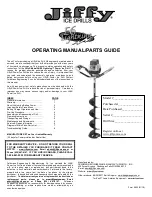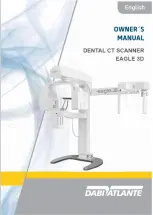
3
Impella LD
®
Circulatory Support System
Aortic Valve
Membrane
Sensor
Differential
Pressure Sensor
Aortic Pressure
Flow to
Aorta
Flow from
Ventricle
Cannula
Ventricular
Pressure
The pressure sensor membrane flexes when the pressure on one side is
different from the pressure on the other side, and the electrical properties
of the membrane change when it flexes. This allows the sensor to generate
an electrical signal proportional to how much the membrane is flexed, and
thus proportional to the difference between the pressure on the outside of
the cannula and the pressure inside. When the Impella LD Catheter is placed
in the correct position across the aortic valve, the top (outer surface) of the
sensor is exposed to the aortic pressure and the bottom (inner surface) of the
sensor is exposed to the ventricular pressure. Therefore, the placement signal
is approximately equal to the difference between the aortic pressure and the
ventricular pressure.
Bl
oo
d P
re
ss
ure
(m
m
Hg
)
Time
Systole
Diastole
120
0
80
Pressure difference (P
Differencial
)
Aortic pressure
P
Differential
=
P
AO
-
P
LV
Left ventricular pressure (P
LV
)
Aortic pressure (P
AO
)
Pressure
difference
Left ventricular
pressure
When the Impella LD Catheter is correctly positioned across the aortic valve,
the changes in pressure associated with the cardiac cycle result in a pulsatile
placement signal. During diastole, the large pressure difference between the
aorta and the left ventricle creates a large electrical signal. Then at the peak
of systole, when the aortic valve opens, the pressure difference between the
aorta and the left ventricle—and thus the electrical signal—is zero.
Thus, the continual pressure changes associated with the cardiac cycle
produce the pulsatile (up and down) waveform seen on the Automated
Impella Controller display.
When the Impella LD
®
Catheter is not properly placed across the aortic valve,
or when it is fully in the aorta or fully in the ventricle, the pressures outside
and inside the cannula are the same throughout the cardiac cycle. As a result,
the pressure on either side of the sensor membrane is the same, resulting in a
flat placement signal.
PURGE CASSETTE
Do not use saline in the purge system.
The purge cassette delivers rinsing fluid to the Impella LD Catheter. The purge
fluid (typically 5% glucose solution in water with Heparin) flows from the
purge cassette through the catheter to the microaxial blood pump to prevent
blood from entering the motor. When the purge cassette is properly installed
in the Automated Impella Controller, the Abiomed® logo is upright and
facing you.
Note:
If included, disconnect and discard the Y Connector from the purge
tubing when setting up the Impella LD System and connect the yellow luer
on the end of the purge tubing directly to the yellow luer on the Impella LD
Catheter
E
NG
LI
SH
Summary of Contents for Impella LD
Page 15: ...13 Impella LD Circulatory Support System ENGLISH...
Page 16: ...Gebrauchsanweisung 14...
Page 30: ...28 Manual del usuario...
Page 44: ...42 Manuale d uso...
Page 58: ...56 Manuale d uso...
Page 72: ...Manuel d utilisation 70...
Page 85: ...83 Impella LD systemet f r cirkulationsst d SVENSKA...
Page 98: ...96 Impella LD kredsl bsst ttesystem DANSK...
Page 111: ...109 Impella LD circulatieodersteunend systeem NEDERLANDS...
Page 112: ...Brukermanual 110...
Page 136: ...134 Instrukcja obs ugi...
Page 149: ...147 System wspomagania kr enia Impella LD POLSKI...
Page 150: ...K ytt ohje 148...
Page 162: ...Manual do Utilizador 160...
Page 175: ...173 Sistema de Suporte Circulat rio Impella LD PORTUGU S...






































